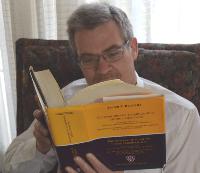| Páginas sobre el tema: [1 2] > | Poll: Should the editor of a text have more work experience than the translator? Autor de la hebra: ProZ.com Staff
|
|---|
This forum topic is for the discussion of the poll question "Should the editor of a text have more work experience than the translator?".
This poll was originally submitted by Monika Coulson
View the poll here
A forum topic will appear each time a new poll is run. For more i... See more This forum topic is for the discussion of the poll question "Should the editor of a text have more work experience than the translator?".
This poll was originally submitted by Monika Coulson
View the poll here
A forum topic will appear each time a new poll is run. For more information, see: http://proz.com/topic/33629 ▲ Collapse
| | | | Caro Maucher 
Alemania
Local time: 23:16
Miembro 2005
inglés al alemán
+ ...
Doesn't this depend on how good the translator is, and how difficult the text? i.e., an easy translation done by a very good translator doesn't require much effort from the editor - a simple check for typos and such may be sufficient. On the other hand, a difficult translation done by a beginner requires much more from the editor, who hopefully has more experience in this case.
| | | | m_temmer 
Local time: 15:16
inglés al neerlandés
+ ...
| I voted other | Apr 2, 2009 |
I think it's above all the competence of the editor that matters. It's not because you have been working for 10 years as a translator or an editor, that you're good at it.
Having more experience than the translator can be useful of course, but in many cases it is not essential.
I would say: the editor has to be more knowledgeable than the translator (or at least as knowledgeable as).
[Edited at 2009-04-02 14:02 GMT]
| | | | marca 
Estados Unidos
Local time: 17:16
francés al inglés
+ ...
| collaboration key | Apr 2, 2009 |
I agree with Caro that the type and quality of text and translators are factors, but, realistically, it's the collaboration that matters. When I worked in an agency, our policy was to defer to the translators whom we knew to be reliable and competent. We certainly edited new-to-us or less-experienced translators with more care and we, the junior editors, knew enough to consult our thirty-years-plus experienced supervisor if we had questions.
I often felt rather ridiculous calling so... See more I agree with Caro that the type and quality of text and translators are factors, but, realistically, it's the collaboration that matters. When I worked in an agency, our policy was to defer to the translators whom we knew to be reliable and competent. We certainly edited new-to-us or less-experienced translators with more care and we, the junior editors, knew enough to consult our thirty-years-plus experienced supervisor if we had questions.
I often felt rather ridiculous calling someone who was so obviously much more experienced than I and questioning something. Yet, often, we were right and the translator would quickly say that he or she had missed that or was in agreement with our suggestion or whatever. Other times, they'd explain why they chose that term or word and we'd make note of their rationale for our own databases. I think I learned as much as about the importance of the editing process from our experienced translators as I did from my supervisor.
I don't think the experience per se matters quite as much as the recognition of what everyone bring to the process. (I knew what I didn't know!) ▲ Collapse
| | |
|
|
|
| Good question, but ....... | Apr 2, 2009 |
I would say "yes" if original text is of high level, with great complication (both in content and sentence), and demanding.
Irony in this case is, editor gets paid less while it should be other way round.
But I rather like to delve into the blurred distinction between "editing" and "proofreading" which are quite often being used interchangeably.
I think there should be a discussion on this subject, hopefully followed by vigorous discussions.
| | | | Reed James
Chile
Local time: 17:16
Miembro 2005
español al inglés
| Excellent point! | Apr 2, 2009 |
Michaël Temmerman wrote:
I think it's above all the competence of the editor that matters. It's not because you have been working for 10 years as a translator or an editor, that you're good at it.
I like the way you put that, Michaël. I agree. Translating and editing is more a matter of being than becoming.
| | | | Steven Capsuto 
Estados Unidos
Local time: 17:16
Miembro 2004
español al inglés
+ ...
Why isn't there an option for "it doesn't matter"?
| | | | TextTrade (X) 
Local time: 00:16
inglés al francés
+ ...
| what they should have is... | Apr 2, 2009 |
... a huuuuge bailout. Wall Street has demonstrated that experience is irrelevant. Why should translation be different from any other business?
| | |
|
|
|
| completely agree | Apr 2, 2009 |
Michaël Temmerman wrote:
I think it's above all the competence of the editor that matters. It's not because you have been working for 10 years as a translator or an editor, that you're good at it.
Having more experience than the translator can be useful of course, but in many cases it is not essential.
I would say: the editor has to be more knowledgeable than the translator (or at least as knowledgeable as).
[Edited at 2009-04-02 14:02 GMT]
I completely agree with Michael, therefore I have chosen the 'other' option.
| | | | Krys Williams 
Reino Unido
Local time: 22:16
Miembro 2003
polaco al inglés
+ ...
| Subject-specific and writing competence is vital | Apr 2, 2009 |
An editor should have a proper knowledge and understanding of the subject field of the document and also excellent writing skills in the target language as appropriate to that subject field.
Sadly, both the above skills are lacking in many cases. I find it difficult to have respect for an editor who tries to justify his/her existence by pointlessly replacing numerous words with exact synonyms (in one recent case with incorrect spelling) that either do not change the meaning one bit... See more An editor should have a proper knowledge and understanding of the subject field of the document and also excellent writing skills in the target language as appropriate to that subject field.
Sadly, both the above skills are lacking in many cases. I find it difficult to have respect for an editor who tries to justify his/her existence by pointlessly replacing numerous words with exact synonyms (in one recent case with incorrect spelling) that either do not change the meaning one bit or are less appropriate for the subject field, or by making clumsy "stylistic" changes to which I would be ashamed to put my name.
I notice that this is becoming increasingly more common, unfortunately. ▲ Collapse
| | | | | If you go by the rate offered, the editor has to be less qualified | Apr 2, 2009 |
I am of the opinion that the person who is required to have more experience (theoretically the editor) should be the higher paid of the two. However, I observe that it is usually the other way round. Although it is very often stated that the hourly rate should work out the same for translating and for editing/proofreading, I find this seldom to be the case. I can usually earn almost twice as much in an hour translating, and - due to the measly proofreading/editing rates offered - it will always ... See more I am of the opinion that the person who is required to have more experience (theoretically the editor) should be the higher paid of the two. However, I observe that it is usually the other way round. Although it is very often stated that the hourly rate should work out the same for translating and for editing/proofreading, I find this seldom to be the case. I can usually earn almost twice as much in an hour translating, and - due to the measly proofreading/editing rates offered - it will always be that way. This makes me assume that I should - ideally - know considerably less than the translator about the job. ▲ Collapse
| | | | Brandis (X)
Local time: 23:16
inglés al alemán
+ ...
| Editor has rejected your work.. | Apr 3, 2009 |
Hi! hence we can not pay you. That is a regular routine, I do not know the editor and I am not paid for revision instead only for the TEP. Why did the editor not do the translation? Was editing a more expensive job? I recollect few such situations, but these days I quote clearly only TEP and not the revision part, as many OS can not afford to pay for this. BR Brandis
| | |
|
|
|
m_temmer 
Local time: 15:16
inglés al neerlandés
+ ...
| don't look at the rates | Apr 3, 2009 |
I can usually earn almost twice as much in an hour translating, and - due to the measly proofreading/editing rates offered - it will always be that way. This makes me assume that I should - ideally - know considerably less than the translator about the job.
That's exactly why I only do this for a couple of well paying customers (my hourly rate for editing is indeed the same as for translation). Plenty of my customers ask me to edit translations, but I simply refuse to because they only offer me peanuts.
Agencies assume that the translator is paid enough to do an excellent job. They think that the editor only has very little work left and doesn't need to be paid a high rate. The underlying assumption is that every translator does a good job. Unfortunately, all too often, that is not the case. I have had two really bad experiences and ever since I'm really picky about who I edit for.
Someone raised the issue of editing vs. proofreading. Personally, they are the same to me. I simply cannot ignore interpretation mistakes, not even when I'm told to only check spelling and grammar. I either do a good job or I do nothing. It can't be in between.
| | | | | Depnds on so many factors | Apr 3, 2009 |
I chose translation revision as the subject of my MA dissertation. I came to the conclusion that there are a host of factors that determine who should do the original translation and who should revise it. Some of these include: mother tongue, linguistic competence, domain-related knowledge and socio-economic factors.
I would nevertheless like to mention that the translation industry is beset by problems in this area. Here are a few:
1. Editing, revision, proof-reading, ... See more I chose translation revision as the subject of my MA dissertation. I came to the conclusion that there are a host of factors that determine who should do the original translation and who should revise it. Some of these include: mother tongue, linguistic competence, domain-related knowledge and socio-economic factors.
I would nevertheless like to mention that the translation industry is beset by problems in this area. Here are a few:
1. Editing, revision, proof-reading, reviewing, checking: what term to use where.
2. Unnecessary changes by the checker (unprofessional, time-wasting, immoral)
3. The assumption that some translation agencies have that the checker must always be right ("our proofreader said this - what have you got to say for yourself?")
4. There is little thought given to the hierarchy of expertise concerning the subject-matter.
5. Ditto no. 4 but relating to linguistic competence (qualifications, experience, etc.)
6. Mother tongue. I translate Finnish-English, so if a Finn reads through my translation I will accept changes that relate to accuracy and typos, but no changes that relate to grammar, lexical choice and style, for example.
7. Little evidence of collaboration/cooperation re. translator, checker, agency, end client
If anyone is interested I can email them a copy of my dissertation if they contact me directly.
best
spencer ▲ Collapse
| | | | | I agree wholeheartedly | Apr 3, 2009 |
Michaël Temmerman wrote: I can usually earn almost twice as much in an hour translating, and - due to the measly proofreading/editing rates offered - it will always be that way. This makes me assume that I should - ideally - know considerably less than the translator about the job. That's exactly why I only do this for a couple of well paying customers (my hourly rate for editing is indeed the same as for translation). Plenty of my customers ask me to edit translations, but I simply refuse to because they only offer me peanuts. Agencies assume that the translator is paid enough to do an excellent job. They think that the editor only has very little work left and doesn't need to be paid a high rate. The underlying assumption is that every translator does a good job. Unfortunately, all too often, that is not the case. I have had two really bad experiences and ever since I'm really picky about who I edit for. Someone raised the issue of editing vs. proofreading. Personally, they are the same to me. I simply cannot ignore interpretation mistakes, not even when I'm told to only check spelling and grammar. I either do a good job or I do nothing. It can't be in between.
I agree with Michael's comment. Agencies think that editing is merely about checking spelling or grammar mistakes. But this is not always the case. An editor has to spend almost as much time on the document as a translator, if not more.Also, if the translation job was done poorly, then the editor has to take care of that issue too.
I would say that it is important for the editor to be competent, the years of experience don't matter.
| | | | | Páginas sobre el tema: [1 2] > | To report site rules violations or get help, contact a site moderator: You can also contact site staff by submitting a support request » Poll: Should the editor of a text have more work experience than the translator? | Trados Business Manager Lite | Create customer quotes and invoices from within Trados Studio
Trados Business Manager Lite helps to simplify and speed up some of the daily tasks, such as invoicing and reporting, associated with running your freelance translation business.
More info » |
| | Pastey | Your smart companion app
Pastey is an innovative desktop application that bridges the gap between human expertise and artificial intelligence. With intuitive keyboard shortcuts, Pastey transforms your source text into AI-powered draft translations.
Find out more » |
|
| | | | X Sign in to your ProZ.com account... | | | | | |













